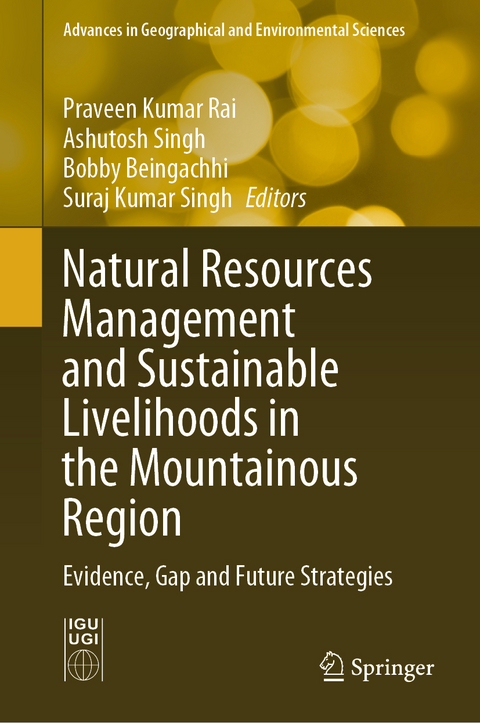
Natural Resources Management and Sustainable Livelihoods in the Mountainous Region
Springer Nature (Verlag)
978-981-97-2099-6 (ISBN)
The environmental degradation in the northeastern region of India is basically attributed to the increasing biotic pressure on the fragile ecosystems in the absence of suitable investments and proper management practices to enhance and conserve the natural resources. Population growth and poverty on the one hand and the pressure of rising demand from wealth and consumerism on the other hand, have been exerting powerful pressure on the ecosystems. Natural resources planning and management and sustainable livelihoods through integrated watershed management is not just a technical challenge; it is also a social challenge. The book is a valuable resource for policymakers, researchers, practitioners and stakeholders involved in natural resource management, sustainable development and watershed management in the Himalayan region.
Dr. Praveen Kumar Rai is an associate professor and the head of the Department of Geography, Khwaja Moinuddin Chishti Language University, Lucknow, India. He also served as an assistant professor at the Amity Institute of Geoinformatics and Remote Sensing, Amity University, Noida, India, and Department of Geography, Banaras Hindu University, Varanasi, India. He has the teaching and research experience of more than 14 years in the field of remote sensing and GIS. His research interests include remote sensing and GIS, glaciology, health and disease modelling, disaster management, and water resource management, among others. He has published more than 72 research papers in international and national journals and has published 7 books with Springer Nature and other publishing houses. He has visited many countries to deliver invited lectures as a keynote speaker. He also serves many international journals as an editorial board member as well as a reviewer. Dr. Ashutosh Singh is an assistant professor at the Department of Geography, Pachhunga University College, Aizawl, India. He completed his Ph.D. in integrated watershed management and sustainable development at Banaras Hindu University in 2014. He has published 1 authored book and 21 research papers and presented many papers at national and international conferences and seminars. His interests include integrated watershed management and development in the Himalayan region, sustainable development, natural resource management and integrated rural area development and management. Dr. Bobby Beingachhi is a dedicated and hard-working academician known for his significant contributions in the field of environmental studies, rural development and rural health care. He is currently an associate professor at the Department of Geography, Pachhunga University College, which is a constituent college of Mizoram University. Dr. Suraj Kumar Singh is currently an associate professor and coordinator at the Centre for Sustainable Development, Suresh Gyan Vihar University, Jaipur, India. Previously, he worked as an assistant professor at the Central University of Jharkhand, Brambe, Ranchi. Prior to that, he also served as a research associate at the National Remote Sensing Centre, Indian Space Research Organization. He earned his Ph.D. degree in 2012 from the Department of Remote Sensing, the Birla Institute of Technology, Ranchi. His research interests include waterlogging and flood hazards, geospatial applications in water resources, disaster management, hydro-geomorphology, urban planning, and wasteland mapping. He has published nearly 130 articles in peer-reviewed journals, 15 books, and 35 book chapters. He has also organized and attended various workshops, seminars, and international conferences.
- CONCEPT OF SUSTAINABLE LIVELIHOOD: A Case Study of Laika Dadhiya forest village, Tinsukia, Assam.- Integrated Hydrologic Assessment of Water Management Options for Regulated Wetlands under Conditions of Rainfall Change: A case study of Bhandara District, India.- Measuring Sustainable Development of Cities Using Remote Sensing and Geospatial Technologies: A Review.- Eco-Entrepreneurship and Sustainable Development in Mizoram’s Mountainous Landscape: Unleashing Potentials for Positive Change.- Micro-credit for micro-entrepreneurs: A study on PM Street Vendor’s Loan with special reference to Mizoram State.- Global and Indian Perspectives on Sustainable Development, Remote Sensing, and Climate Change: An Overview.- Status and challenges for Sustainable Rural Livelihood faced by the Small Tea Growers(STG) in the Darjeeling hills, India.- Marginal Uplands in the Philippines: Characteristics, Occurrence, and Management for Improved Crop Production and Environmental Quality.- DYNAMIC TRANSITIONS IN WULAR LAKE’S LANDUSE AND LANDCOVER : ANALYZING THE ROLE OF URBAN DEVELOPMENT AND AGRICULTURAL ACTIVITIES.- Petrography and major oxide geochemistry of dolerite dykes from Kunnam region Villupuram, Tamilnadu, Southern India.- Analyzing the Driving Factors Causing Urban Sprawl Using Logistic Regression model in Greater Shillong planning area, India.- Slope stability Analysis of road cut slopes using Limit Equilibrium Method in Kumaun Lesser Himalayan Belt.- Assessment of land use/land cover change and forest fragmentation in Kohima district, Nagaland: A mountainous region of northeast India.- Overview of Sustainable Development Goals.- Effectiveness of Drainage Morphmetric Analysis for Water Resource Management in Changing Climate Scenarios.- PFAFSTETTER CODE BASED WATERSHED DELIMITATION, GEOLOGICAL OBSERVATIONS, LAND COVER, AND POPULATION DENSITY ANALYSIS FOR MIZORAM THROUGH REMOTE SENSING: AIDING AND/ OR IMPROVISING THE DIGITAL WATERSHED ATLAS OF INDIA.- The Role of Entrepreneurship in Promoting Sustainable Development through the ODOP Programme in Uttar Pradesh.- Effects of Land Use and Land Cover Change on Physical and Chemical Properties of Soil in Tuirini Watershed, Mizoram, NE India.- Natural Disasters in Uttarakhand: Their Root Causes, Effects, and Suggestions.- Leaf to life: An overview of the socio-economic status of tea tribes in Assam.
| Erscheinungsdatum | 01.08.2024 |
|---|---|
| Reihe/Serie | Advances in Geographical and Environmental Sciences |
| Zusatzinfo | 105 Illustrations, color; 10 Illustrations, black and white; VII, 345 p. 115 illus., 105 illus. in color. |
| Verlagsort | Singapore |
| Sprache | englisch |
| Maße | 155 x 235 mm |
| Themenwelt | Naturwissenschaften ► Biologie ► Ökologie / Naturschutz |
| Naturwissenschaften ► Geowissenschaften ► Hydrologie / Ozeanografie | |
| ISBN-10 | 981-97-2099-0 / 9819720990 |
| ISBN-13 | 978-981-97-2099-6 / 9789819720996 |
| Zustand | Neuware |
| Informationen gemäß Produktsicherheitsverordnung (GPSR) | |
| Haben Sie eine Frage zum Produkt? |
aus dem Bereich


